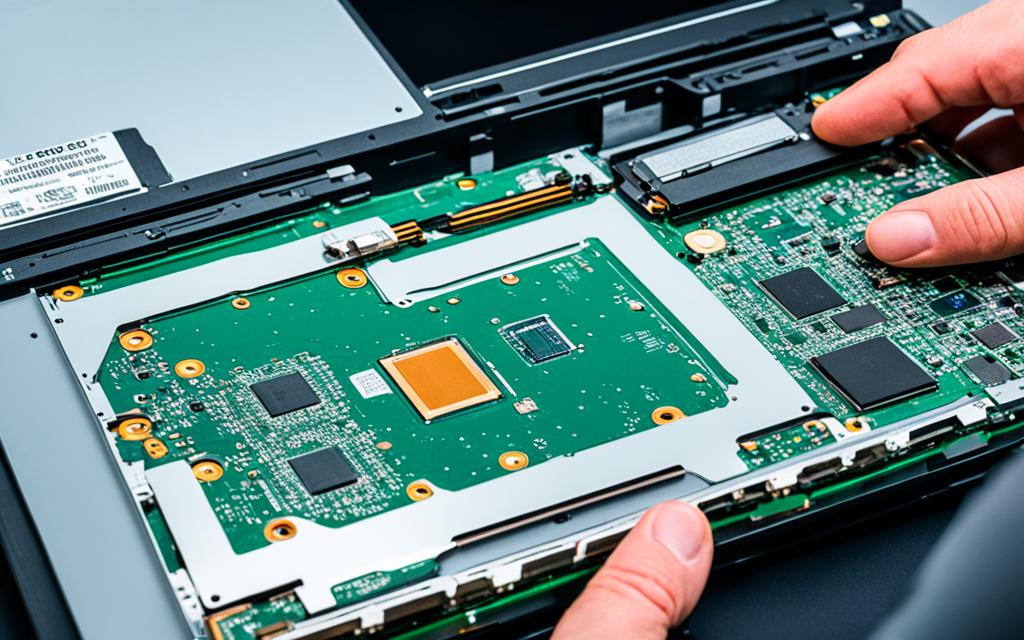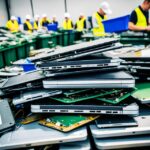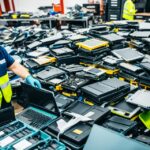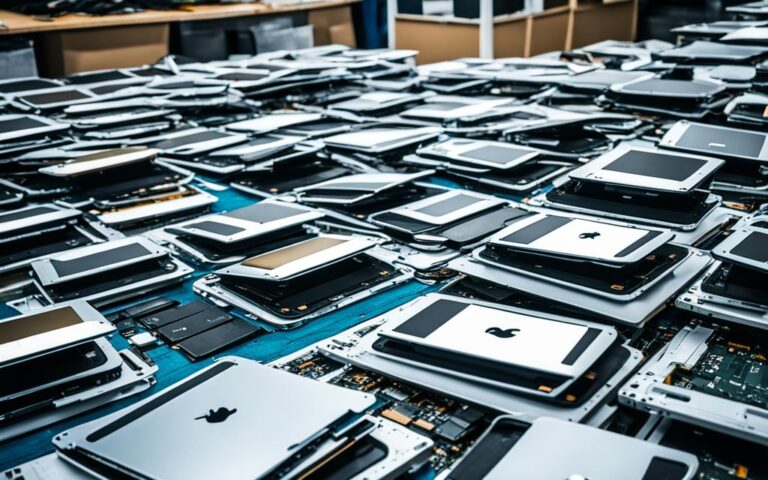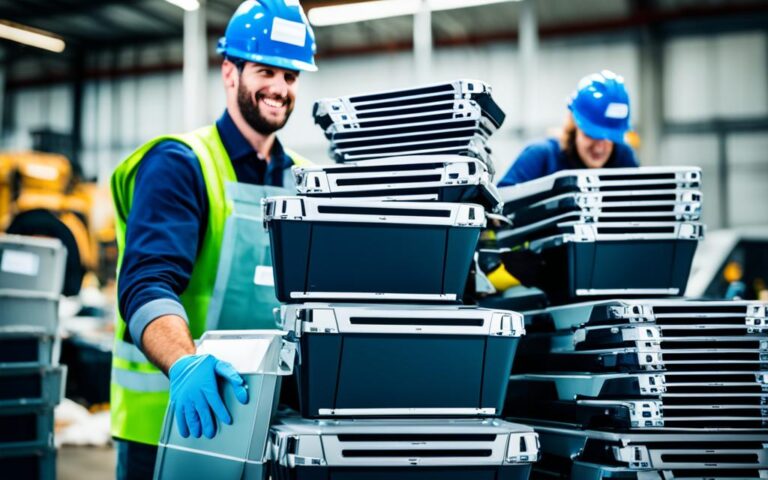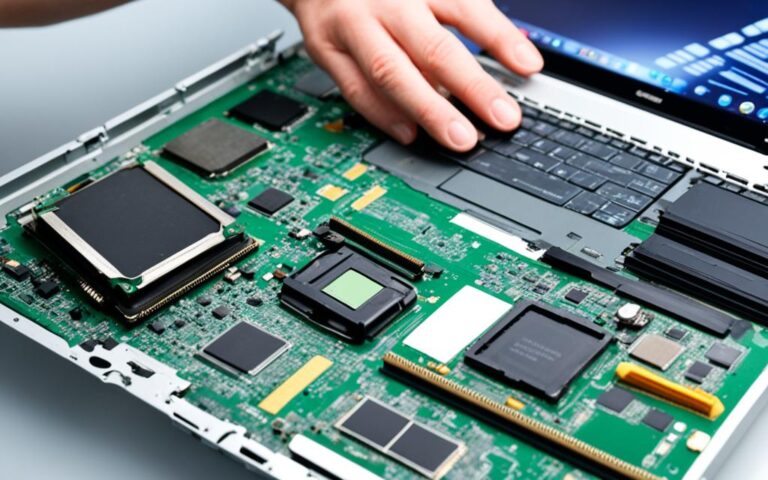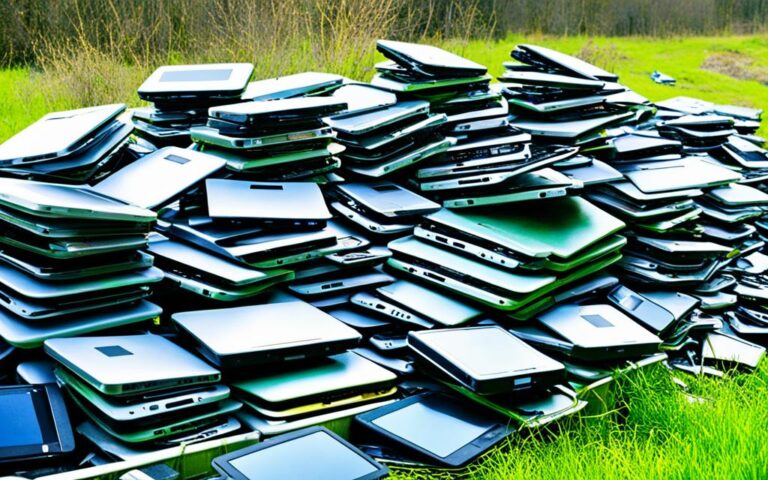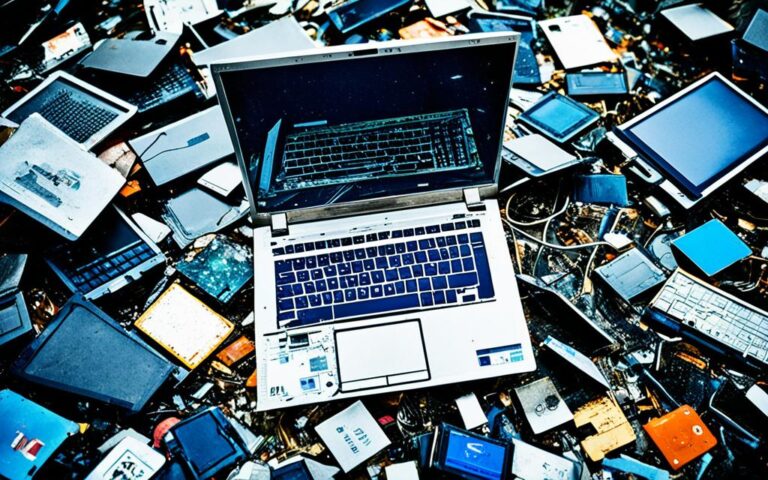Mobile Workstation Recycling: Keeping High-Performance Laptops in Circulation
In today’s technology-driven world, high-performance laptops have become an essential tool for professionals across various industries. However, the rapid advancement of technology often leads to the disposal of older laptops, contributing to electronic waste and environmental concerns. That’s where mobile workstation recycling comes into play, offering sustainable solutions to ensure that these laptops remain in circulation and minimize their impact on the environment.
Mobile workstation recycling involves the repair, recovery, and reuse of high-performance laptops, allowing them to continue their lifespan instead of ending up in landfills. Companies like Dell Technologies are leading the way in sustainable technology, prioritizing innovative design, the use of sustainable materials, and energy efficiency in their mobile workstations.
By incorporating over 50% recycled or renewable materials in their products and packaging by 2030, Dell is actively working towards a circular economy. They understand the importance of using resources responsibly and reducing their environmental impact. Dell’s commitment to sustainability extends beyond their products; they also collaborate with partners to reduce carbon footprints and improve energy efficiency throughout the supply chain.
By opting for mobile workstation recycling and choosing brands like Dell, individuals and businesses can make a significant contribution to environmental preservation. It’s a choice that not only ensures the continued availability of high-performance laptops but also supports a more sustainable and eco-friendly future.
Dell’s Approach to Sustainable Design
Dell’s commitment to sustainability goes beyond just environmental responsibility. Their sustainable design principles form the foundation of their innovative laptop designs and their contribution to the circular economy.
At Dell, sustainable design starts with a comprehensive plan that leverages world-class engineering and supply chain expertise. This allows them to create technology that is not only innovative but also environmentally responsible.
One of the key aspects of Dell’s sustainable design is their adherence to circular principles. They strive to reduce dependency on new products and materials by prioritizing repair, recovery, and reuse. By adopting this approach, Dell extends the lifecycle of their laptops and minimizes waste, contributing to a more sustainable future.
An excellent example of Dell’s dedication to sustainable design is their partnership with Intel to develop Concept Luna. This prototype laptop explores revolutionary ideas that make components easily accessible and replaceable, using circular materials. By incorporating circularity into the design process, Dell aims to create laptops that are not only high-performing but also environmentally friendly.
Beyond their commitment to circularity, Dell is also at the forefront of incorporating advanced technologies to prepare for the future of PC manufacturing. They embrace telemetry and robotic automation, enabling them to optimize manufacturing processes, reduce waste, and further enhance sustainability.
The Benefits of Dell’s Sustainable Design:
- Reduction of waste through repair, recovery, and reuse
- Promotion of the circular economy
- High-performing laptops with easily accessible and replaceable components
- Incorporation of circular materials
- Optimized manufacturing processes through telemetry and robotic automation
Dell’s approach to sustainable design sets them apart as a leader in the industry. Their commitment to the circular economy and innovative laptop design ensures that customers can make environmentally conscious choices without compromising on performance or style.
Sustainable Materials and Packaging
Dell is committed to using sustainable materials in their products to reduce environmental impact. They aim to have over 50% of product content and 100% of packaging made from recycled or renewable materials by 2030. Their commercial laptops already use packaging made from 100% recycled or renewable materials, including paper alternatives to plastic. This packaging is also 100% recyclable, further contributing to their goal of keeping products out of landfills.
Benefits of Sustainable Materials and Packaging
Opting for sustainable materials and responsible packaging brings numerous benefits to both the environment and customers:
- Reduced Environmental Impact: By using recycled or renewable materials, Dell significantly reduces the need for new resources, conserving energy and reducing carbon emissions.
- Promotion of Circular Economy: The use of sustainable materials and recyclable packaging aligns with Dell’s commitment to the circular economy, where products are designed to be repaired, recovered, and reused, decreasing waste and driving a more sustainable future.
- Customer Confidence: When customers choose Dell’s products with sustainable materials and packaging, they are actively supporting responsible business practices and contributing to a greener planet.
Recycled and Renewable Materials in Dell’s Packaging
Dell’s commitment to sustainable packaging is evident in their use of recycled or renewable materials. Currently, their commercial laptops are packaged using 100% recycled or renewable materials, including paper alternatives. This eco-friendly packaging is not only durable and protective, but also 100% recyclable, ensuring that it can be easily reused or recycled at the end of its lifecycle.
Dell’s use of recycled or renewable materials in packaging greatly reduces the environmental impact associated with traditional packaging materials, such as plastic. By choosing sustainable packaging, Dell is actively working to minimize waste and conserve natural resources.
Sustainability Efforts Beyond Packaging
Dell’s commitment to sustainability extends beyond packaging materials. They strive for sustainable practices throughout their supply chain, from product design to manufacturing and beyond.
“At Dell, we believe it’s our responsibility to make a difference—both in the way we operate and by offering products that help our customers help the planet. It’s what drives us.”
By prioritizing sustainable materials and responsible packaging, Dell is leading the way in sustainable technology, ensuring that their products not only meet high-performance standards, but also have a positive impact on the environment, now and in the future.
| Benefits of Sustainable Materials and Packaging | Recycled and Renewable Materials in Dell’s Packaging |
|---|---|
| Reduced Environmental Impact | Use of 100% recycled or renewable materials |
| Promotion of Circular Economy | Paper alternatives to plastic |
| Customer Confidence | 100% recyclable packaging |
Energy Efficiency and Environmental Standards
Dell is committed to designing energy efficient products that prioritize both customer goals and environmental sustainability. They understand the importance of reducing energy consumption without sacrificing performance. To ensure their products meet the highest energy efficiency standards, Dell actively participates in various eco labels programs such as Energy Star, EPEAT, TCO, 80 Plus, and CELP. These eco labels guarantee that Dell’s products have undergone rigorous testing and meet specific criteria for energy efficiency and sustainability.
One of Dell’s key focuses is on energy efficient data centre solutions. Powered by Intel Xeon Scalable processors, Dell’s solutions optimize current data centres for a more sustainable future. By utilizing advanced technology and software management tools like Intel Active Management Technology, Dell devices contribute to reducing carbon footprints. These tools enable businesses to access and manage their devices remotely, minimizing the need for fuel consumption and physical travel.
Dell’s Commitment to Energy Efficiency
Dell’s commitment to energy efficiency extends to every aspect of their products and operations. Through continuous innovation and research, they strive to develop energy efficient technologies that reduce environmental impact. By investing in energy efficient solutions, Dell not only helps businesses save on costs but also reduces their carbon footprint, contributing to a more sustainable future.
| Eco Labels Programs | Description |
|---|---|
| Energy Star | A voluntary program that sets energy efficiency standards for consumer electronics and office equipment. |
| EPEAT | A global rating system that evaluates the environmental impact of electronics based on their lifecycle and sustainability. |
| TCO Certified | A certification program that ensures the social and environmental responsibility of IT products. |
| 80 Plus | A certification that recognizes power supply units for their energy efficiency in desktop computers and servers. |
| CELP | An initiative that focuses on energy efficient communication protocols and technologies. |
Dell’s Commitment to the Circular Economy
Dell is dedicated to embracing the principles of circular economy and actively involving customers, suppliers, and industry stakeholders to accelerate the transition. By collaborating with influential nonprofit organizations like Lonely Whale and participating in industry partnerships such as NextWave Plastics, Circular Electronics Partnership (CEP), and Platform for Accelerating the Circular Economy (PACE), Dell demonstrates its commitment to driving sustainable change.
One of the ways Dell showcases its commitment is through its annual ESG report. This report highlights Dell’s climate action initiatives, its efforts towards a circular economy, and its focus on building digitally inclusive communities and an inclusive workforce.
Dell aims to establish and expand commercial-scale supply chains that repurpose ocean-bound plastics, contributing to the reduction of plastic waste in our oceans. Additionally, Dell actively fosters collective action on global initiatives, specifically addressing the challenges and opportunities surrounding circular electronics.
Engaging Stakeholders for a Sustainable Future
Dell understands that engaging stakeholders is crucial for driving the circular economy forward. By involving customers, suppliers, and industry partners, Dell can collectively work towards sustainable solutions. Engaging stakeholders allows Dell to exchange knowledge, share best practices, and develop innovative ideas to enhance the circular economy.
“Engaging stakeholders is crucial for driving the circular economy forward.”
Through collaborative efforts, Dell aspires to create a more sustainable future and promote the responsible use of resources. By adhering to circular principles, Dell aims to reduce waste, prolong product lifecycles, and minimize the environmental impact of its operations.
Circular Electronics Partnership
The Circular Electronics Partnership (CEP) is a notable industry collaboration that Dell actively participates in. CEP brings together leaders from the electronics industry, recycling organizations, and governments to develop innovative and sustainable solutions for managing electronic waste. This partnership aims to create a closed-loop system that promotes the recycling and reuse of electronic devices, reducing the need for raw materials and minimizing environmental harm.
| Key Initiatives of Dell’s Commitment to Circular Economy | Benefits |
|---|---|
| Establish and expand commercial-scale ocean-bound plastics supply chains | – Reduces plastic waste in oceans – Preserves marine ecosystems – Creates sustainable sourcing practices for materials |
| Drive collective action on global initiatives for circular electronics | – Encourages industry collaboration – Encourages responsible e-waste management – Reduces the environmental impact of electronic devices |
| Collaborate with nonprofit organizations and industry partnerships | – Shares knowledge and best practices – Fosters innovation and sustainable solutions – Amplifies the impact of circular economy initiatives |
Dell’s commitment to the circular economy extends beyond its own operations. By actively engaging stakeholders and participating in industry collaborations like CEP, Dell strives to create a more sustainable future for the electronics industry and drive positive change on a global scale.
Conclusion
Dell Technologies leads the way in sustainable technology and mobile workstation recycling. Their unwavering commitment to innovative design, sustainable materials, and energy efficiency ensures that high-performance laptops are not only kept in circulation but also contribute to a circular economy. By prioritizing repair, recovery, and reuse, Dell sets a benchmark for responsible technology practices.
Moreover, Dell’s dedication to environmental responsibility shines through their partnerships and collaborations. By working with nonprofit organizations and industry initiatives, such as Lonely Whale and Circular Electronics Partnership (CEP), Dell actively drives collective action for a more sustainable future. They understand that addressing the challenges of sustainability requires collaboration and a shared commitment.
When customers choose Dell’s mobile workstations, they can trust that they are making a sustainable choice. Dell’s unwavering commitment to sustainability and the environment underpins the entire lifecycle of their products. From design to packaging and energy efficiency, Dell’s holistic approach embodies their values and their mission to create a more sustainable world.
FAQ
What is mobile workstation recycling?
Mobile workstation recycling refers to the process of recycling high-performance laptops to keep them in circulation. Instead of disposing of these laptops, they are collected, refurbished, and resold or donated, reducing waste and extending the lifespan of the devices.
How does Dell approach sustainable design?
Dell follows circular economy principles by reducing dependency on new products and materials. They focus on repair, recovery, and reuse and partner with Intel to explore innovative ideas for easily accessible and replaceable components. They also incorporate telemetry and robotic automation for future PC manufacturing.
How does Dell use sustainable materials and packaging?
Dell aims to have over 50% of product content and 100% of packaging made from recycled or renewable materials by 2030. Their commercial laptops already use packaging made from 100% recycled or renewable materials, including paper alternatives to plastic. This packaging is also 100% recyclable.
How does Dell prioritize energy efficiency and meet environmental standards?
Dell participates in various eco label programs such as Energy Star, EPEAT, TCO, 80 Plus, and CELP. They design energy efficient data center solutions powered by Intel Xeon Scalable processors and incorporate modern management tools to reduce carbon footprints through remote access and decreased fuel consumption.
How does Dell commit to the circular economy?
Dell collaborates with nonprofit organizations and industry alliances to drive the circular transition. They partner with organizations like Lonely Whale, NextWave Plastics, Circular Electronics Partnership (CEP), and Platform for Accelerating the Circular Economy (PACE). Dell aims to establish and expand commercial-scale ocean-bound plastics supply chains and drive collective action on global initiatives for circular electronics.
Why should I choose Dell’s mobile workstations?
By choosing Dell’s mobile workstations, you can be confident in their commitment to sustainability and the environment. Dell’s focus on sustainable design, use of eco-friendly materials and packaging, energy efficiency, and dedication to the circular economy ensure that high-performance laptops are kept in circulation and contribute to a more sustainable future.

